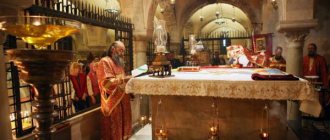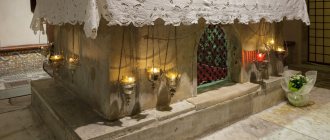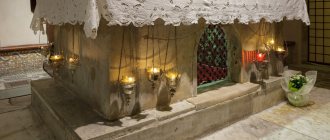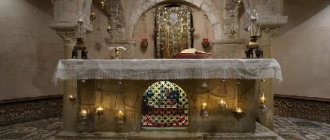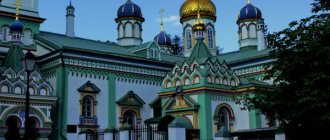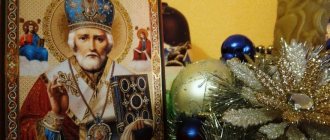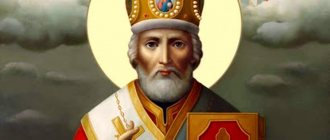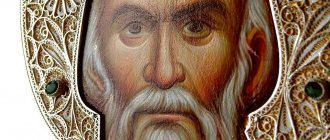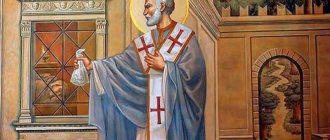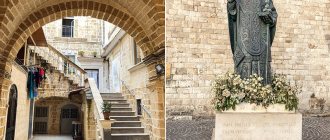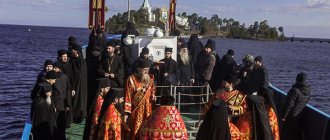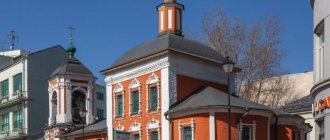The childhood of the future saint
The Roman province of Lycia, namely the Greek colony of Patara, became the birthplace of a special boy. This happened in 270 AD.
His parents were true Christians, their faith was passed on to their son. Father Nicolas, as the child was named, was a wealthy man and managed to give his son an education. In some sources there is an erroneous opinion that the parents of the future Wonderworker and Pleasant of God were named Epiphanius and Nonna. Such people really lived at that time, but they were the parents of another saint, whose name was Nicholas of Pinar.
The parents gave their son the name Nikolai, prophesying that he would become the conqueror of nations. According to the faith of those who loved their son, God gave the boy a special anointing from birth to overcome the evil of this age.
According to the legends of the saints, during the presentation before God, while immersed in the font, the baby rose to his feet and stood there on his own for several hours, with his hands raised to glorify the Almighty.
Interesting. Traditions also claim that the little boy applied only to the right breast, thereby predetermining his place near the Lord. On days when Orthodox Christians usually do not eat fast food, which is Wednesday and Friday, little Nicholas demanded breast milk only after his parents’ evening prayer. In the future, the Holy Pleasant will strictly adhere to fasting these days.
Nicholas the Wonderworker
Miracles of Nikolai Ugodnik
Nicholas the Pleasant or the Wonderworker is known for the wise decisions and divine deeds that he performed.
Tax on Lycia
Nicholas was a wise archbishop and worked miracles thanks to his humility and deep faith. One day the king imposed an exorbitant tax on his flock. The people could not pay for it in such quantities. People began to complain to Nicholas and fervently pray that the Tsar would have mercy on them. There was a famine in Lycia.
The saint went to the king himself in Constantinople with a request for pardon. When the saint entered the reception room, he could not see the ruler - a ray of sunlight blinded the archbishop. Then Nikolai took off his robe and left it hanging in the air, blocking out the interfering light. He told the emperor about the unfair tax that was imposed on Lycia. Amazed by what he saw, the king himself put the mantle on the saint and issued a decree to remove the tax from Lycia. Nicholas thanked the Tsar and left the reception room.
The saint was a wise man and understood that at any moment the emperor could change his mind. Therefore, it was important to proclaim the decree as soon as possible. Nicholas sealed the decree in a bottle and sent it by sea. He prayed fervently all night that the message would arrive by morning. The next day, one of the bishops of the church saw the bottle and read the decree to the people.
At this time, the courtiers convinced the king that the tax did not need to be abolished completely, but left minimal. The emperor was influenced by their reasoning and asked Nicholas to return the decree. But the saint admitted that it had already been made public in Lycia. When the king found out that this was true, he apologized to the saint and never again had any claims to the Lycian land.
Lyceum and hunger
At the beginning of the 4th century, Lycia was hit by a terrible famine - due to severe drought, wheat and grain crops did not grow. People were left without food. Then Nicholas appeared in a dream in the guise of an angel to the captain of a passing merchant ship. The saint said that he would buy all the grain that the merchant was carrying and would pay right now in gold. Waking up, the captain found a bag of money in his hand. He turned the ship to the shores of Lycia and distributed to the people all the bread that was in his hold.
After the winter of that year, Lycia was starving again. Passing merchants had a large amount of grain on the ship, but they were taking it to Constantinople and had to deliver the goods. Nikolai invited them to unload exactly 1 ton of bread. In return, he promised to spare the merchants from punishment for underweight, since the port would not be able to accuse them of this. When the traders arrived in Constantinople, they found that all the holds were completely filled.
Time to learn Divine Scripture
It took a talented student from Lycia very little time to learn the deep wisdom of Holy Scripture.
A short biography of Nicholas the Wonderworker says that in his adolescence he did not like to spend time in empty entertainment with friends; all his free time from studying he spent in the temple.
Filled with the grace of God, led by the Holy Spirit, the youth perfected his mind and body to correspond to the Temple in which the Holy Spirit lives (First Cor. 3:16).
Seeing the youth’s dedication to Christ, his uncle, known to the laity as Nicholas of Patarsky, entrusted his God-fearing nephew with the position of reader. After the death of his parents, the future Saint distributed his entire inheritance to the poor and devoted himself completely to God.
Holiday dates
The Catholic and Orthodox churches celebrate the feasts of St. Nicholas on different days.
Arrival of the relics in Baria
On May 9, the relics of St. Nicholas arrived in Bari. This day is a public holiday in Italy; many pilgrims come to the relics to say words of prayer and ask Nicholas for help in life's difficulties. In the Russian Orthodox Church this day is celebrated on May 22.
Birthday
The Nativity of St. Nicholas the Wonderworker falls on August 11th. The celebration has not become widely known since it was introduced recently - in 2004.
Day of death
The day of the Assumption of St. Nicholas the Wonderworker is usually celebrated on December 19 in many countries around the world. On this day, parents put a gift under their children’s pillows, just as the saint once saved girls from poverty by throwing gold into their stockings.
Beginning to Serve the Lord
Serving under his uncle, Nikolai was ordained to the priesthood. This was the time after the terrible Christian persecution.
The Roman Emperor Diocletian introduced a law allowing the extermination of Christians throughout the empire, which was supported by Emperor Maximian. Over the course of many years (303-311), Christians were killed, thrown into ovens, and given over to be torn to pieces by wild animals, until before his death Emperor Galerius ordered that different beliefs be tolerated. His successor Licinius, who reigned until 324, allowed Christian communities to develop.
While on a pilgrimage to Palestine, the priest approached the temple, but found it closed. After praying in front of the gate, he was surprised by the fall of the castles.
During his stay in Palestine, the Wonderworker learned that the Lycian people were dying of hunger, and a terrible disaster had befallen the country.
The Holy Pleasant spent hours in fasting and prayer, asking God to forgive the people and save them from death by starvation.
Prayer to the saint:
- Prayer to St. Nicholas the Wonderworker for drunkenness
- Prayer to Nicholas the Wonderworker for my husband
- Prayer to Saint Nicholas for anxiety about the future
In distant Italy at this time, a merchant loaded grain onto ships to go to distant countries, but the decision was changed after a night's sleep, during which the Saint ordered the merchant to sail to Lycia, leaving the gold.
The next morning, the Italian discovered the coins in his clenched hand. Not daring to violate the order of the Saint, he sailed to Lycia, which saved many people from death.
Interesting. In Palestine, information about good deeds granted by God through the prayers of faith, performed by the Holy Saint, is passed on from generation to generation. To this day, Christian Palestinians come with requests and prayers to the Church of St. Nicholas the Wonderworker, built in the city of Beit Jala on the site of a destroyed third-century temple in which the Saint prayed.
The saint’s great desire was to remain in solitude, but at God’s command, not in his native Patara, where the inhabitants of the city knew him well, but in Myra. Here the Priest lived like a beggar, being content with the smallest of both housing and food.
By this time, the Bishop of Myra was already preaching in Myra. Nowadays it is the Turkish province of Antalya, the city of Demre.
Icon of St. Nicholas the Wonderworker in the city of Beit Jala
Church of St. Nicholas
At the beginning of the 20th century, a decision was made to revive the temple, but until now the building had the status of a museum. In 2009, a group of pilgrims wanted to hold a service in the temple.
In 2010, the service was conducted by the archbishop himself.
Another church of St. Nicholas exists in the city of Bari. The main budget, which was allocated for the revival of the church in Mir (Demre), went towards the restoration of this building. In 1914, the doors of the shrine were opened to pilgrims.
Receiving the rank of archbishop
The story of ordination to the rank of archbishop is filled with God's guidance.
In the city of Myra, after the death of the archbishop, at a meeting of local bishops they could not make a choice of a new anointed one of God.
The clergy of Myra spent hours in prayer until the oldest of the bishops had a dream. The Lord indicated to him that the first to attend the morning service would be the man pleasing to God on the throne of the archbishop, whose name was Nicholas.
The elder conveyed his dream to the rest of the congregation. With great excitement, the priests stood along the porch of the church, waiting for the future archbishop.
As soon as the saint appeared at the entrance to the temple, he was asked to give his name. The answer came humbly and quietly that his name was Nikolai, and he recognized himself as the master’s slave.
The good news about the chosen one spread throughout the city at midnight, and on the same night Nicholas was given all the rights of the Archbishop of Myra.
“Receive, brothers, your shepherd, whom the Holy Spirit has anointed for you and to whom he has entrusted the stewardship of your souls. It was not a human council, but the Judgment of God that established it. Now we have the one we were waiting for, accepted and found, the one we were looking for. Under his wise guidance, we can confidently hope to appear before the Lord on the day of His glory and judgment!”
The new rank did not become the reason for the saint’s pride and exaltation; these feelings were alien to him. The head of the Myra diocese decides to serve people entirely, forgetting about his own needs.
Saint Nicholas the Wonderworker
Saint Nicholas the Wonderworker, Saint Nicholas the Pleasant, Saint Nicholas - Archbishop of Myra in Lycia, became famous as a great saint of God. He is revered in the Orthodox, Catholic and other churches.
Life of Nicholas the Wonderworker (biography)
Saint Nicholas was born in the second half of the 3rd century in the city of Patara, a region of Lycia in Asia Minor. His parents Theophanes and Nonna were from a noble family and very wealthy, which did not prevent them from being pious Christians, merciful to the poor and zealous towards God.
They had no children until they were very old; in constant fervent prayer, they asked the Almighty to give them a son, promising to devote him to the service of God. Their prayer was heard: the Lord gave them a son, who at holy baptism received the name Nicholas, which means in Greek “victorious people.”
Already in the first days of his infancy, the future Wonderworker showed that he was destined for special service to the Lord. A legend has been preserved that during baptism, when the ceremony was very long, he, unsupported by anyone, stood in the font for three hours. From the very first days, Saint Nicholas began a strict ascetic life, to which he remained faithful until the grave.
All the unusual behavior of the child showed his parents that he would become a great saint of God, so they paid special attention to his upbringing and tried, first of all, to instill in their son the truths of Christianity and direct him to a righteous life. The youth soon comprehended, thanks to his rich talents and guided by the Holy Spirit, book wisdom.
While excelling in his studies, the youth Nikolai also excelled in his pious life. He was not interested in the empty conversations of his peers: an infectious example of camaraderie leading to anything bad was alien to him.
Avoiding vain, sinful entertainment, the youth Nicholas was distinguished by exemplary chastity and avoided all unclean thoughts. He spent almost all his time reading the Holy Scriptures and performing feats of fasting and prayer. He had such love for the temple of God that he sometimes spent whole days and nights there in divine prayer and reading divine books.
The pious life of young Nicholas soon became known to all residents of the city of Patara. The bishop in this city was his uncle, also named Nikolai. Noticing that his nephew stood out among other young people for his virtues and strict ascetic life, he began to persuade his parents to give him to the service of the Lord. They readily agreed because they had made such a vow before the birth of their son. His uncle, the bishop, ordained him a presbyter.
While performing the Sacrament of the Priesthood over Saint Nicholas, the bishop, filled with the Holy Spirit, prophetically predicted to the people the great future of the Pleasant of God: “Behold, brothers, I see a new sun rising over the ends of the earth, which will be a consolation for all the sad. Blessed is the flock that is worthy to have such a shepherd! He will feed well the souls of the lost, feeding them in the pastures of piety; and he will be a warm helper to everyone in trouble!”
Having accepted the priesthood, Saint Nicholas began to lead an even more strict ascetic life. Out of deep humility, he performed his spiritual exploits in private. But God’s Providence wanted the saint’s virtuous life to direct others to the path of truth.
The uncle bishop went to Palestine, and entrusted the administration of his diocese to his nephew, the presbyter. He devoted himself wholeheartedly to fulfilling the difficult duties of episcopal administration. He did a lot of good to his flock, showing widespread charity. By that time, his parents had died, leaving him a rich inheritance, which he used all to help the poor. The following incident also testifies to his extreme humility. In Patara there lived a poor man who had three beautiful daughters. He was so poor that he had no money to marry off his daughters. What can the need of a person who is not sufficiently imbued with Christian consciousness lead to?
The unfortunate father's need led him to the terrible idea of sacrificing the honor of his daughters and extracting from their beauty the funds necessary for their dowry.
But, fortunately, in their city there was a good shepherd, St. Nicholas, who vigilantly monitored the needs of his flock. Having received a revelation from the Lord about his father’s criminal intentions, he decided to deliver him from physical poverty in order to thereby save his family from spiritual death. He planned to do a good deed in such a way that no one knew about him as a benefactor, not even the one to whom he did the good.
Taking a large bundle of gold, at midnight, when everyone was asleep and could not see it, he went up to the hut of the unfortunate father and threw the gold inside through the window, and he hurriedly returned home. In the morning, the father found gold, but could not know who his secret benefactor was. Deciding that God’s Providence Himself had sent him this help, he thanked the Lord and was soon able to marry off his eldest daughter.
Saint Nicholas, when he saw that his good deed had brought the proper fruit, decided to see it through to the end. One of the following nights, he also secretly threw another bag of gold through the window into the poor man's hut.
The father soon gave his second daughter in marriage, firmly hoping that the Lord would show mercy to his third daughter in the same way. But he decided at all costs to recognize his secret benefactor and adequately thank him. To do this, he did not sleep at night, waiting for his arrival.
He did not have to wait long: soon the good shepherd of Christ came for the third time. Hearing the sound of falling gold, the father hastily left the house and caught up with his secret benefactor. Recognizing Saint Nicholas in him, he fell at his feet, kissed them and thanked him as a liberator from spiritual death.
Upon his uncle’s return from Palestine, Saint Nicholas himself gathered there. While traveling on the ship, he showed the gift of deep insight and miracles: he foretold the approaching severe storm and pacified it with the power of his prayer. Soon, here on the ship, he performed a great miracle, resurrecting a young sailor who had fallen from the mast onto the deck and died. On the way, the ship often landed on the shore. Saint Nicholas everywhere took care to heal the ailments of local residents: he healed some of incurable diseases, expelled from others the evil spirits that tormented them, and finally gave others consolation in their sorrows.
Upon his arrival in Palestine, Saint Nicholas settled near Jerusalem in the village of Beit Jala (biblical Ephrathah), which is located on the way to Bethlehem. All the inhabitants of this blessed village are Orthodox; There are two Orthodox churches there, one of which, in the name of St. Nicholas, was built on the spot where the saint once lived in a cave, which now serves as a place of worship.
There is a legend that while visiting the holy places of Palestine, Saint Nicholas wished one night to pray in the temple; approached the doors, which were locked, and the doors themselves opened by Miraculous Power so that the Chosen One of God could enter the temple and fulfill the pious desire of his soul.
Inflamed with love for the Divine Lover of Mankind, Saint Nicholas had the desire to remain forever in Palestine, withdraw from people and secretly strive before the Heavenly Father. But the Lord wanted such a lamp of faith not to remain hidden in the desert, but to brightly illuminate the Lycian country. And so, by will from above, the pious presbyter returned to his homeland.
Wanting to get away from the bustle of the world, Saint Nicholas went not to Patara, but to the Zion monastery, founded by his uncle, the bishop, where he was received by the brethren with great joy. He thought of staying in the quiet solitude of the monastic cell for the rest of his life. But the time came when the great Pleasant of God had to act as the supreme leader of the Lycian Church in order to enlighten people with the light of the Gospel teaching and his virtuous life.
One day, while standing in prayer, he heard a voice: “Nikolai! You must enter into the service of the people if you want to receive a crown from Me!”
Holy horror seized Presbyter Nicholas: what exactly did the wonderful voice command him to do? “Nikolai! This monastery is not the field in which you can bear the fruit I expect from you. Leave here and go into the world, among people, so that My name may be glorified in you!”
Obeying this command, Saint Nicholas left the monastery and chose as his place of residence not his city of Patara, where everyone knew him and showed him honor, but the large city of Myra, the capital and metropolis of the Lycian land, where, unknown to anyone, he could more quickly avoid worldly glory . He lived like a beggar, had no place to lay his head, but inevitably attended all church services. As much as the Pleasant of God humbled himself, the Lord, who humiliates the proud and exalts the humble, exalted him. Archbishop John of the entire Lycian country has died. All local bishops gathered in Myra to elect a new archbishop. Much was proposed for the election of intelligent and honest people, but there was no general agreement. The Lord promised a more worthy husband to occupy this position than those who were among them. The bishops fervently prayed to God, asking him to indicate the most worthy person.
A man, illuminated by an unearthly light, appeared in a vision to one of the oldest bishops and ordered that night to stand in the vestibule of the church and notice who would be the first to come to the church for the morning service: this is the man pleasing to the Lord, whom the bishops should appoint as their archbishop; His name was also revealed - Nikolai.
Having received this divine revelation, the elder bishop told others about it, who, hoping for God’s mercy, intensified their prayers.
As night fell, the elder bishop stood in the vestibule of the church, awaiting the arrival of the chosen one. Saint Nicholas, getting up at midnight, came to the temple. The elder stopped him and asked about his name. He quietly and modestly answered: “I am called Nikolai, servant of your shrine, master!”
Judging by the name and deep humility of the newcomer, the elder was convinced that he was God’s chosen one. He took him by the hand and led him to the council of bishops. Everyone joyfully accepted him and placed him in the middle of the temple. Despite the night time, the news of the miraculous election spread throughout the city; a lot of people gathered. The elder bishop, who was granted the vision, addressed everyone with the words: “Receive, brothers, your shepherd, whom the Holy Spirit has anointed for you and to whom he has entrusted the stewardship of your souls. It was not a human council, but the Judgment of God that established it. Now we have the one we were waiting for, accepted and found, the one we were looking for. Under his wise guidance, we can confidently hope to appear before the Lord on the day of His glory and judgment!”
Upon entering the administration of the Myra diocese, Saint Nicholas said to himself: “Now, Nicholas, your rank and your position require you to live entirely not for yourself, but for others!”
Now he did not hide his good deeds for the good of his flock and for the glorification of the name of God; but he was, as always, meek and humble in spirit, kind in heart, alien to all arrogance and self-interest; he observed strict moderation and simplicity: he wore simple clothes, ate lean food once a day - in the evening. All day long the great archpastor performed works of piety and pastoral service. The doors of his house were open to everyone: he received everyone with love and cordiality, being a father to orphans, a nourisher to the poor, a comforter to those who weep, and an intercessor to the oppressed. His flock flourished.
But the days of testing were approaching. The Church of Christ was persecuted by the Emperor Diocletian (285-30). Temples were destroyed, divine and liturgical books were burned; bishops and priests were imprisoned and tortured. All Christians were subjected to all sorts of insults and torments. The persecution also reached the Lycian Church.
During these difficult days, Saint Nicholas supported his flock in the faith, loudly and openly preaching the name of God, for which he was imprisoned, where he did not cease to strengthen the faith among the prisoners and confirmed them in a strong confession of the Lord, so that they would be ready to suffer for Christ.
Diocletian's successor Galerius stopped the persecution. Saint Nicholas, upon leaving prison, again occupied the See of Myra and with even greater zeal devoted himself to the fulfillment of his high duties. He became famous especially for his zeal for the establishment of the Orthodox faith and the eradication of paganism and heresies.
The Church of Christ suffered especially badly at the beginning of the 4th century from the heresy of Arius. (He rejected the deity of the Son of God and did not recognize Him as Consubstantial with the Father.)
Desiring to establish peace in the flock of Christ, shocked by the heresy of Ariev’s false teaching. Equal to the Apostles Emperor Constantine convened the First Ecumenical Council of 325 in Nicaea, where three hundred and eighteen bishops gathered under the chairmanship of the emperor; here the teachings of Arius and his followers were condemned.
Saints Athanasius of Alexandria and Nicholas the Wonderworker especially labored at this Council. Other saints defended Orthodoxy with the help of their enlightenment. Saint Nicholas defended the faith by faith itself - by the fact that all Christians, starting with the Apostles, believed in the Divinity of Jesus Christ.
There is a legend that during one of the council meetings, unable to tolerate the blasphemy of Arius, Saint Nicholas struck this heretic on the cheek. The Fathers of the Council considered such an act an excess of jealousy, deprived the wonderworker of the benefits of his episcopal rank - the omophorion - and imprisoned him in a prison tower. But they were soon convinced that Saint Nicholas was right, especially since many of them had a vision when, before their eyes, our Lord Jesus Christ gave Saint Nicholas the Gospel, and the Most Holy Theotokos placed an omophorion on him. They freed him from prison, restored him to his former rank and glorified him as the great Pleasant of God.
The local tradition of the Nicene Church not only faithfully preserves the memory of St. Nicholas the Wonderworker, but also sharply distinguishes him from among the three hundred and eighteen fathers, whom he considers all his patrons. Even Muslim Turks have deep respect for the saint: in the tower they still carefully preserve the prison where this great man was imprisoned.
Upon his return from the Council, Saint Nicholas continued his beneficial pastoral work in building the Church of Christ: he confirmed Christians in the faith, converted pagans to the true faith and admonished heretics, thereby saving them from destruction.
While caring for the spiritual needs of his flock, Saint Nicholas did not neglect to satisfy their bodily needs. When a great famine occurred in Lycia, the good shepherd, in order to save the starving, created a new miracle: one merchant loaded a large ship with bread and on the eve of sailing somewhere to the west he saw St. Nicholas in a dream, who ordered him to deliver all the grain to Lycia, for he was buying he has all the cargo and gives him three gold coins as a deposit. Waking up, the merchant was very surprised to find three gold coins actually clutched in his hand. He realized that this was a command from above, brought bread to Lycia, and the starving people were saved. Here he spoke about the vision, and the citizens recognized their archbishop from his description.
Even during his lifetime, Saint Nicholas became famous as a pacifier of warring parties, a defender of the innocently condemned, and a deliverer from vain death.
During the reign of Constantine the Great, a rebellion broke out in the country of Phrygia. To pacify him, the king sent an army there under the command of three commanders: Nepotian, Urs and Erpilion. Their ships were washed up by a storm on the shores of Lycia, where they had to stand for a long time. The supplies were depleted, and they began to rob the population who resisted, and a fierce battle took place near the city of Plakomat. Having learned about this, Nicholas the Wonderworker personally arrived there, stopped the hostility, then, together with three governors, went to Phrygia, where with a kind word and exhortation, without the use of military force, he pacified the rebellion. Here he was informed that during his absence from the city of Myra, the local city governor, Eustathius, innocently sentenced to death three citizens slandered by their enemies. Saint Nicholas hurried to Myra and with him three royal commanders, who were very fond of this kind bishop, who had rendered them a great service.
They arrived in Myra at the very moment of execution. The executioner is already raising his sword to behead the unfortunate, but Saint Nicholas with his imperious hand snatches the sword from him and commands the release of the innocently condemned. None of those present dared to resist him: everyone understood that the will of God was being done. The three royal commanders marveled at this, not suspecting that they themselves would soon need the miraculous intercession of the saint.
Returning to the court, they earned the honor and favor of the king, which aroused envy and enmity on the part of other courtiers, who slandered these three commanders before the king as if they were trying to seize power. Envious slanderers managed to convince the king: three commanders were imprisoned and sentenced to death. The prison guard warned them that the execution was to take place the next day. The innocently condemned began to fervently pray to God, asking for intercession through St. Nicholas. That same night, the Pleasant of God appeared in a dream to the king and imperiously demanded the release of the three commanders, threatening to rebel and deprive the king of power.
“Who are you that you dare to demand and threaten the king?”
“I am Nicholas, Archbishop of Lycia!”
Waking up, the king began to think about this dream. That same night, Saint Nicholas also appeared to the governor of the city, Evlavius, and demanded the release of the innocently convicted. The king called Evlavius to him, and having learned that he had the same vision, he ordered three commanders to be brought.
“What kind of witchcraft are you doing to give me and Eulavius visions in our sleep?” - asked the king and told them about the appearance of St. Nicholas.
“We don’t do any witchcraft,” the governors answered, “but we ourselves previously witnessed how this bishop saved innocent people from the death penalty in Myra!”
The king ordered their case to be examined and, convinced of their innocence, released them.
During his life, the miracle worker provided help to people who even did not know him at all. One day, a ship sailing from Egypt to Lycia was caught in a severe storm. The sails were torn off, the masts were broken, the waves were ready to swallow the ship, doomed to inevitable death. No human power could prevent it. One hope is to ask for help from St. Nicholas, whom, however, none of these sailors had ever seen, but everyone knew about his miraculous intercession. The dying shipmen began to pray fervently, and then Saint Nicholas appeared at the stern at the helm, began to steer the ship and brought it safely to the harbor.
Not only believers, but also pagans turned to him, and the saint responded with his constant miraculous help to everyone who sought it. In those he saved from physical troubles, he aroused repentance for sins and a desire to improve their lives.
According to Saint Andrew of Crete, Nicholas the Wonderworker appeared to people burdened with various disasters, gave them help and saved them from death: “With his deeds and virtuous life, Saint Nicholas shone in the World, like a morning star among the clouds, like a beautiful moon in its full moon. For the Church of Christ he was a brightly shining sun, he adorned Her like a lily at a spring, and was for Her a fragrant world!”
The Lord allowed His great Saint to live to a ripe old age. But the time came when he, too, had to repay the common debt of human nature. After a short illness, he died peacefully on December 6, 342, and was buried in the cathedral church of the city of Myra.
During his lifetime, Saint Nicholas was a benefactor of the human race; He did not cease to be one even after his death. The Lord granted his honest body incorruptibility and special miraculous power. His relics began - and continue to this day - to exude fragrant myrrh, which has the gift of working miracles.
First Ecumenical Council
At this time, the persecution of Christians was still ongoing. The miracle worker and his flock end up in prison. Seeing the constantly praying priest and feeling his support, many Christians persevered and did not renounce their faith.
A zealous Christian, the Bishop of Myra was intolerant of paganism. On his orders, the famous temple of the goddess Artemis was destroyed.
At the First Ecumenical Council (325) the issue of celebrating Easter, the Creeds, and the Divinity of Christ was decided.
Bishop Arius and several priests began to refute the divinity of Jesus, for which, according to some historians, the Archbishop of Myra slapped the heretic for outright heresy. This fact was not confirmed in official reports, but is mentioned in some documents of the bishops present at the Council.
Texts of prayers
During prayer, you can ask St. Nicholas the Wonderworker to help:
- with health problems;
- change destined hardships;
- support when making important business decisions;
- in promotion at work;
- about peace after the death of dear people;
- in healing the soul;
- escape from loneliness;
- get married successfully;
- find love.
Good deeds performed by the Holy Saint
According to historians, Nikolai Ugodnik always took the side of slandered people and demanded that those convicted be treated fairly.
Wherever the Wonderworker appeared, he helped everyone:
- He healed the sick;
- cast out demons;
- gave consolation;
- fed the hungry;
- clothed the naked;
- restored justice.
His good deeds were performed with meekness and humility; there was no arrogance or greed in him. The Holy Saint directed all the glory and gratitude from people to God.
There is no end to the list of good deeds performed by Saint Nicholas the Wonderworker.
Historical records contain information about the resurrection of the dead, the healing of the sick, the liberation of captives literally from under the sword, and much more.
Ark with a particle of the relics of St. Nicholas the Wonderworker in the altar of the Basilica of St. Nicholas the Wonderworker in Bari
Transfer of relics to the Italian city of Baria and the island of Lido
The relics of St. Nicholas were of interest to the Italian people, as they could increase the prestige of the city in which they would end up. The Barians and Venetians decided to steal the relics of the saint in 1087. The Bari military tied up the monks and took 80% of the remaining remains. The Venetians arrived in Mira one day later, so they only took 20% of the remains.
Documentation
An authentic biography of St. Nicholas has not been published, since in the existing data the writings about the Myra and Pinar figures are intertwined. Nicholas the Wonderworker was mentioned in the following documents:
- legends of Metaphrastus from 1720. They were found by Phalakonius. Authorship of Patriarch Methodius;
- “Chetii-Minea” from Saint D. Rostov. Contains abbreviations of the legends of Metaphrastus (descriptions of the life of both Nikolaevs in one person);
- legends about Nicholas of Myra from the monastery of St. Sava and the Sinai Temple;
- Life of Nicholas of Pinar and Mirliki from Antonin-Kapustin.
Life of the Saint
Anthony Borisov, priest, associate professor of the Moscow Theological Academy: Saint Nicholas in the Orthodox Church and beyond, not only in Catholic but also in Protestant culture, is a symbol and image of mercy and love for people. According to his life, Saint Nicholas did not distinguish between people in the sense of whether they are Christians or not Christians, whether they are Orthodox or not. And in our time, his help in various everyday needs and difficulties extends to everyone who sincerely calls out in faith...
The Saint was born around the year 270 in the city of Patara in the region of Lycia, in Asia Minor. Nowadays it is the Turkish province of Antalya, which at that time belonged to the Byzantine Empire. Pious parents begged for the child for a long time. After the long-awaited birth, which according to the new style is celebrated on August 11, the baby immediately began to show miracles. He will stand in the baptismal font without support for three hours as a sign of veneration of the Holy Trinity.
Leading an ascetic prayerful lifestyle, young Nicholas accepts the rank of presbyter from the hands of his uncle, the bishop, also Nicholas, and begins to do works of mercy, showing extraordinary humility and love for his flock. One of the most beloved episodes in the life of the great saint by all believers is when he prevented three poor girls from being sent to a brothel.
Priest Nikolai Konyukhov, cleric of the Church of the Life-Giving Trinity: One man had three daughters, they had no money and they could not get married. And so every night he threw bags of gold. He really felt very subtly and did not denounce this father: how do you want to give your daughters to a shameful task? He just helped. We miss this. Instead of coming up, waving your finger and moralizing, denouncing people in every possible way, you can simply help and support.
It is in Russia that Saint Nicholas is rightfully considered the most beloved and revered. “Second after God” - this is how St. Nicholas the Wonderworker was called in Rus'. Not one saint of God has so many temples dedicated to him. In Moscow alone today there are more than sixty of them. An architectural monument of federal significance of the 17th century, the famous St. Nicholas Church, built in the Moscow Baroque style, is rightfully considered the most beautiful Moscow church dedicated to St. Nicholas.
Archpriest Nikolai Shumsky, rector of the Church of St. Nicholas in Khamovniki: The very personality of St. Nicholas the Wonderworker is amazing. He is a very kind person. On the one hand, he is a universal, universal saint, but at the same time he is a very close, national saint. After all, many people previously believed that he was generally Russian and therefore accepted him as a close person.
During his lifetime, Nikolai the Wonderworker, who tamed the elements of the sea, from time immemorial served as the patron saint of travelers, and especially Russian sailors. In Kronstadt, Arkhangelsk, Sevastopol and other cities there are maritime St. Nicholas churches.
Vladimir Maltsev, captain 1st rank reserve: A striking example of the fact that sailors have such a reverent attitude towards St. Nicholas the Wonderworker; he is considered one of the main saints. In November 1985, our ship went to sea. The sea was stormy, at first the storm was about four points, then it increased to 6-7 points. The ship was of small displacement, and it was thrown around like a piece of wood, the bulkheads cracked. At this time I was standing as an officer on watch, and a damp, slightly frightened man in the uniform of a lieutenant commander appeared on the bridge and reported that he had just been overboard. One wave threw him overboard, the second wave threw him back. But I consider this a miracle...
It is believed that Saint Nicholas also helps in litigation and those who are in prison. Since he himself, having already become a bishop in the large Lycian city of Myra, was twice imprisoned.
Anthony Borisov, priest, associate professor of the Moscow Theological Academy: Saint Nicholas lived in a very difficult era, when the Eastern Church was engulfed in heresy, and Saint Nicholas himself, according to his life, took a direct part in the victory over this heresy. It cannot be said that Nicholas the Wonderworker was such an absolutely benevolent, complacent person. There is a certain romanticization in the lives of the saints. For example, at the First Ecumenical Council he rather rudely denounced the bishop Arius and hit him. In the life of St. There were different actions that can be assessed differently. And this is a reminder to us that if something like this happens in our lives, sometimes not very pleasant, this is not a reason to despair.
